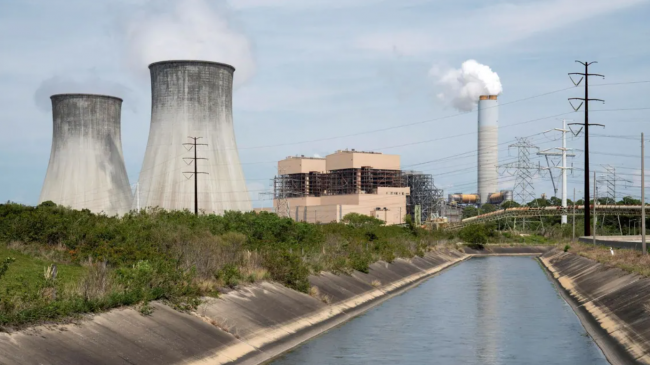Articles Menu

Jun 30, 2022
Video here.
In a blow to the fight against climate change, the United States Supreme Court on Thursday limited how the nation's main anti-air-pollution law can be used to reduce carbon dioxide emissions from power plants.
By a 6-3 vote, with conservatives in the majority, the court said that the Clean Air Act does not give the Environmental Protection Agency (EPA) broad authority to regulate greenhouse gas emissions from power plants that contribute to global warming.
The court's ruling could complicate the Biden administration's plans to combat climate change. Its proposal to regulate power plant emissions is expected by the end of the year.
President Joe Biden aims to cut the nation's greenhouse gas emissions in half by the end of the decade and to have an emissions-free power sector by 2035. Power plants account for roughly 30 per cent of carbon dioxide output.
"Capping carbon dioxide emissions at a level that will force a nationwide transition away from the use of coal to generate electricity may be a sensible 'solution to the crisis of the day,' " Chief Justice John Roberts wrote in his opinion for the court.
But Roberts wrote that the Clean Air Act doesn't give the EPA the authority to do so and that Congress must speak clearly on this subject.
"A decision of such magnitude and consequence rests with Congress itself, or an agency acting pursuant to a clear delegation from that representative body," he wrote.

Biden, in a statement, called the ruling "another devastating decision that aims to take our country backwards." He said he would "not relent in using my lawful authorities to protect public health and tackle the climate crisis."
The Sierra Club characterized the opinion as "a deeply disappointing and dangerous decision."
"This decision gives coal executives and far-right politicians exactly what they asked for by frustrating EPA's efforts to set strong, effective carbon pollution standards from power plants that would help protect our communities and families," the environmental organization said in a statement.
The ruling came on the same day Biden accused the Supreme Court of "outrageous behaviour" in a speech at the end of the NATO summit in Spain, referring to the top court's opinion last week in which abortion rights protections were overturned.
United Nations spokesperson Stephane Dujarric deemed it "a setback in our fight against climate change."
"But we also need to remember that an emergency as global in nature as climate change requires a global response, and the actions of a single nation should not and cannot make or break whether we reach our climate objectives," Dujarric said.
In a dissent, Justice Elena Kagan wrote that the decision strips the EPA of the power Congress gave it.
"Whatever else this Court may know about, it does not have a clue about how to address climate change," said Kagan.
"The Court appoints itself — instead of Congress or the expert agency — the decision-makers on climate policy. I cannot think of many things more frightening."
Reaction from Democratic congress member from Florida:
The justices heard arguments in the case on the same day that a United Nations panel's report warned that the effects of climate change are about to get much worse, likely making the world sicker, hungrier, poorer and more dangerous in the coming years.
The power plant case has a long and complicated history that begins with the Obama administration's Clean Power Plan. That plan would have required states to reduce emissions from the generation of electricity, mainly by shifting away from coal-fired plants.
But that plan never took effect. Acting in a lawsuit filed by West Virginia and others, the Supreme Court blocked it in 2016 by a 5-4 vote, with conservatives in the majority.
With the plan on hold, the legal fight over it continued. But after President Donald Trump took office, the EPA repealed the Obama-era plan. The agency argued that its authority to reduce carbon emissions was limited and it devised a new plan that sharply reduced the federal government's role in the issue.
New York, 21 other mainly Democratic states, the District of Columbia and some of the nation's largest cities sued over the Trump plan. The federal appeals court in Washington ruled against both the repeal and the new plan, and its decision left nothing in effect while the new administration drafted a new policy.
Adding to the unusual nature of the high court's involvement, the reductions sought in the Obama plan by 2030 already have been achieved through the market-driven closure of hundreds of coal plants.
Power plant operators serving 40 million people called on the court to preserve the companies' flexibility to reduce emissions while maintaining reliable service. Prominent businesses that include Apple, Amazon, Google, Microsoft and Tesla also backed the administration.
Nineteen mostly Republican-led states and coal companies led the fight at the Supreme Court against broad EPA authority to regulate carbon output.
The EPA was established in 1970 by Republican Richard Nixon's administration.
Read the Supreme Court opinion:
The opinion was one of two issued by the Supreme Court on Thursday, with all cases heard in the 2021-22 session now adjudicated.
Liberal Justice Stephen Breyer announced his retirement effective Thursday, with Ketanji Brown Jackson to be sworn in. Jackson, nominated by Biden, will become the first Black woman to serve on the U.S. Supreme Court.
With files from CBC News and Reuters
[Top photo: The U.S. Supreme Court dealt a blow to the fight against climate change by ruling the Environmental Protection Agency can’t put limits on emissions from coal-fired energy plants.]